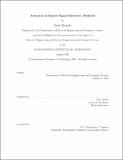Advances in sparse signal recovery methods
Author(s)
Berinde, Radu
DownloadFull printable version (1.210Mb)
Other Contributors
Massachusetts Institute of Technology. Dept. of Electrical Engineering and Computer Science.
Advisor
Piotr Indyk.
Terms of use
Metadata
Show full item recordAbstract
The general problem of obtaining a useful succinct representation (sketch) of some piece of data is ubiquitous; it has applications in signal acquisition, data compression, sub-linear space algorithms, etc. In this thesis we focus on sparse recovery, where the goal is to recover sparse vectors exactly, and to approximately recover nearly-sparse vectors. More precisely, from the short representation of a vector x, we want to recover a vector x* such that the approximation error ... is comparable to the "tail" min[subscript x'] ... where x' ranges over all vectors with at most k terms. The sparse recovery problem has been subject to extensive research over the last few years, notably in areas such as data stream computing and compressed sensing. We consider two types of sketches: linear and non-linear. For the linear sketching case, where the compressed representation of x is Ax for a measurement matrix A, we introduce a class of binary sparse matrices as valid measurement matrices. We show that they can be used with the popular geometric " 1 minimization" recovery procedure. We also present two iterative recovery algorithms, Sparse Matching Pursuit and Sequential Sparse Matching Pursuit, that can be used with the same matrices. Thanks to the sparsity of the matrices, the resulting algorithms are much more efficient than the ones previously known, while maintaining high quality of recovery. We also show experiments which establish the practicality of these algorithms. For the non-linear case, we present a better analysis of a class of counter algorithms which process large streams of items and maintain enough data to approximately recover the item frequencies. The class includes the popular FREQUENT and SPACESAVING algorithms. We show that the errors in the approximations generated by these algorithms do not grow with the frequencies of the most frequent elements, but only depend on the remaining "tail" of the frequency vector. Therefore, they provide a non-linear sparse recovery scheme, achieving compression rates that are an order of magnitude better than their linear counterparts.
Description
Thesis (M. Eng.)--Massachusetts Institute of Technology, Dept. of Electrical Engineering and Computer Science, 2009. Cataloged from PDF version of thesis. Includes bibliographical references (p. 96-101).
Date issued
2009Department
Massachusetts Institute of Technology. Department of Electrical Engineering and Computer SciencePublisher
Massachusetts Institute of Technology
Keywords
Electrical Engineering and Computer Science.